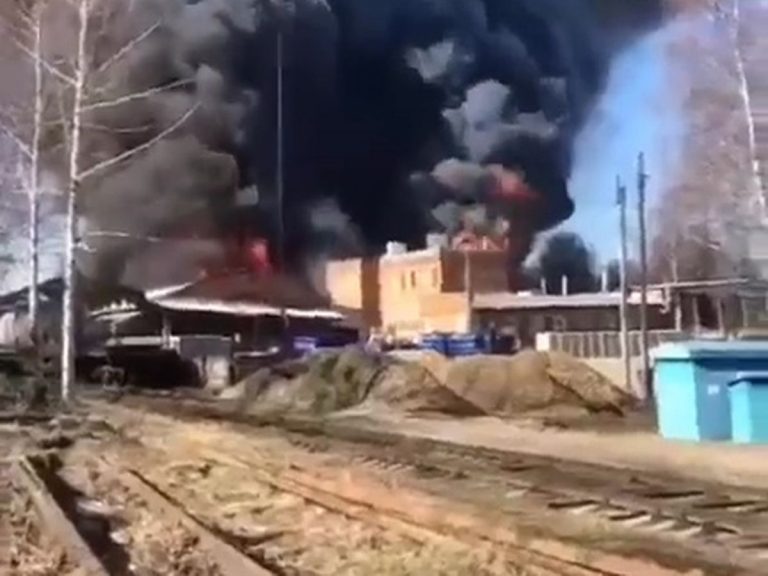Just one day after the Russian Federation showcased a new and highly destructive intercontinental ballistic missile, which it calls the RS-28 Sarmat, but is nicknamed “Satan II” by the West, the country’s largest chemical plant suffered a serious blaze.
Dmitrievsky Chemical Plant
According to Daily Mail, a huge fire erupted at the Dmitrievsky Chemical Plant, located in Kineshma East of Moscow and less than 1,000 kilometers from the border with Ukraine.
The outlet states the facility “produces more industrial solvents than any other in Russia.”
A Russian-language report by Ivanovo News claims that the fire — which was contained to 1,500 square meters — was caused by a 41-year-old female employee who spilled acetone into plastic containers, generating a static electric discharge, which sparked the fire.
RELATED READING:
- A String of Fires Destroys Food Processing Facilities Across America
- Washington Rattles Its Saber at India After Russian Oil Purchases
- EU Parliament Hears Beijing Has a ‘Red Line’ That Russia Should Not Cross
Unfortunately for the employee, 25 percent of her body suffered burns, states the report.
Success
You are now signed up for our newsletter
Success
Check your email to complete sign up
The article also stated that a nearby school was evacuated for safety reasons, and that, “As a result of the fire, the workshop burned down completely, the car that transported the antiseptic liquid was damaged, making it impossible to continue its operation,” according to Google Translate.
Some English-language social media sleuths posit that the chemicals manufactured at Dmitrievsky are utilized as propellants for Russian missiles.
If so, the fire may be particularly notable, as it was the second serious blaze of its kind in Russia the same day.
Power grid failure
At the Central Research Institute of the Aerospace Defense Forces in Tver, a massive fire broke out on the second floor of the building, reported Russian state-media TASS.
The article was notably subtitled: “According to preliminary reports, the fire was caused by a power grid failure.”
In an additional article, TASS also stated that according to an unnamed source, the Tver Aerospace Defense Forces installation suffered an earlier short circuit fire in 2019: “On March 6, 2019, a short circuited lamp in a cabinet on the second floor of the Central Research Institute caused a fire. It was quickly put out.”
The site is notable because it is reported to be responsible for developing the advanced Iskander and S-400 missile systems.
The Defense Ministry of Ukraine’s official Twitter account proudly declared from an iPhone, “Corruption and irresponsibility in russia [sic] has dealt another insidious blow to its war efforts.”
“In Tver, a research institute that develops russia’s Iskander missiles and systems for SU-27 and TU-160 bombers, which have been destroying peaceful Ukrainian cities, has burned down.”
Further reporting by TASS stated that 7 people died and 25 suffered injuries, as some were forced to jump from windows to escape flames that had engulfed 2,500 square meters of the building.
Potential sabotage
Notably, breaking reporting by TASS late in the evening of April 21 stated that firefighters were not called to the scene until 90 minutes after the blaze had broken out.
An unidentified source told the agency, “The emergencies service was informed about the blaze at 11:08 a.m. However, the fire started at 09:30. They tried to put it out on their own first.”
And was paraphrased as stating, “In his words, at some point, a decision was made to open windows in the building. The move was intended to keep dense smoke from building up in the indoor air, but, instead, it provided a steady flow of oxygen to the fire source.”
“This, combined with lost time, floor structure and other factors, caused the fire to spread uncontrollably. On top of that, no evacuation of personnel was ordered.”
On April 20, The Moscow Times also notably reported that forest fires are raging wild in Siberia, stating “The current area of forest fires burning across Russia is twice as large as that of the same time last year.”
The military losses may be significant for Vladimir Putin’s military effort in Ukraine.
In an April 18 address to the joint committees of the State Duma, Bank of Russia Governor Elvira Nabiullina admitted that “restrictions on imports, foreign trade logistics, and in the future with possible restrictions on the export of Russian products,” resulting from heavy and ubiquitous international sanctions, would soon be felt in the “real sectors” of the economy.
“At the moment, perhaps this problem is not yet so strongly felt, because there are still reserves in the economy,” Nabiullina stated. “But the period when the economy can live on reserves is finite.”
Nabiullina targeted Q2 and Q3 of this year as the timing for when Russia would have to seriously “look for new partners and new logistics.”
The Governor added that the central bank is “well aware that this period may be accompanied by a surge in prices for certain goods.”
And continued, “Therefore, inflation will be above the target. And you need to understand that such an excess of inflation will be largely due not to high demand, but to restrictions on the supply side of goods, with low supply.”

















